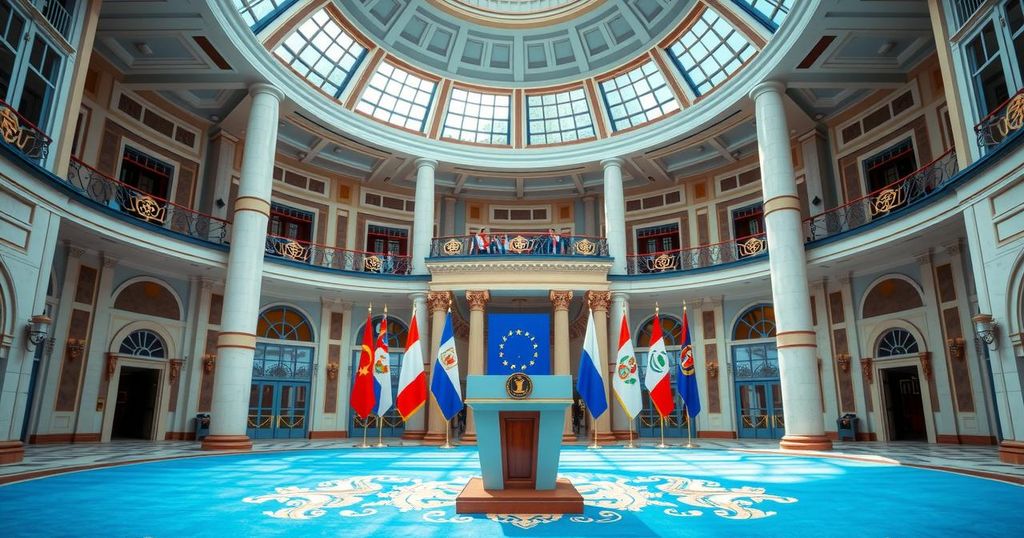President Claudia Sheinbaum discussed new ambassadors, including U.S. envoy Ronald Johnson, and the upcoming historic judicial elections during her May 19 mañanera. She expressed confidence in widespread voter participation while supporting Governor Marina del Pilar Ávila amidst controversy over her visa status.
In her Monday morning press conference, President Claudia Sheinbaum addressed a few important topics, including the introduction of new ambassadors to Mexico and the judicial elections set for June 1. This meeting, known as a mañanera, provided a mix of updates, largely centered around international relations and upcoming political events.
Among the new ambassadors welcomed to Mexico was Ronald Johnson, the new U.S. ambassador, a former envoy to El Salvador. Sheinbaum highlighted this meeting with Johnson, posting a picture on social media after accepting his letter of credence from President Donald Trump. Johnson wasn’t the only ambassador introduced; Sheinbaum also accepted letters from the ambassadors of Algeria, the Dominican Republic, Colombia, and Slovakia during the session.
A reporter pointed out Johnson’s active arrival in Mexico, particularly mentioning his dinner with Eduardo Verástegui, an ultra-conservative political figure. Carlos Slim, the country’s richest man, was also at this dinner, which added another layer of intrigue to the night. Verástegui, known for attempting a presidential run in 2024, recently faced a setback with his candidacy rejected due to insufficient signatures.
Despite this, Sheinbaum opted not to address the dinner specifics but instead emphasized the need for a solid relationship with the United States. She previously mentioned her desire for “coordination” and “collaboration,” as well as a mutual respect in the partnership.
On another note, Sheinbaum expressed optimism regarding the upcoming judicial elections, marking them as a first in Mexico’s history. These elections, scheduled for Sunday, June 1, will allow citizens not just to vote but to select Supreme Court justices and judges, a process Sheinbaum believes will foster a more democratic judiciary. “The people will decide who they want… it’s unprecedented,” she stated. However, when pressed about potential turnout figures, she acknowledged she didn’t have specifics, mentioning that polls showed about half of respondents planned to vote.
She went on to argue that these elections are necessary to combat systemic issues, like corruption in the judiciary, saying it’s a step towards eliminating nepotism and ensuring justice against organized crime. Yet concerns linger about the electoral process, particularly regarding potential party influence and possible coercion from criminal groups aimed at manipulating public votes.
Switching gears, Sheinbaum reaffirmed her admiration for Baja California’s Governor Marina del Pilar Ávila. This support came after news that both Ávila and her husband had their U.S. tourist visas revoked. She insisted there were no investigations against the governor from the Federal Attorney General’s Office. Additionally, although there are rumors of potential money laundering links involving her husband, Ávila firmly denies any wrongdoing. Sheinbaum defended Ávila’s leadership, asserting, “The people like her a lot,” and claiming she has witnessed this support firsthand during her visits to Baja California.
In summary, President Sheinbaum’s recent mañanera highlighted significant diplomatic engagements with new ambassadors, especially the U.S. envoy Johnson. The upcoming judicial elections on June 1 were emphasized as a historic moment aimed at promoting democracy in Mexico’s judiciary. Although Sheinbaum’s support for Governor Ávila came amidst challenging scrutiny about her visa issues and controversies, the president voiced confidence in the governor’s governance and popularity. The political landscape continues to evolve in Mexico with these events, presenting both opportunities and challenges ahead.
Original Source: mexiconewsdaily.com






